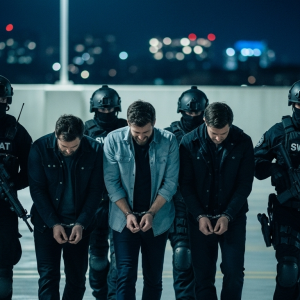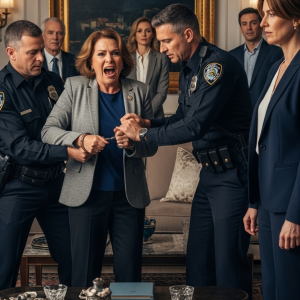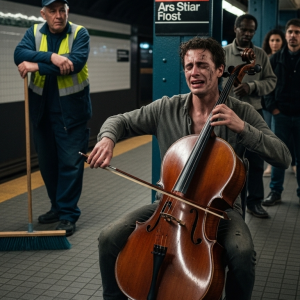The air in the grand Miller estate was thick with the scent of lilies and the heavier weight of unspoken resentment. George Miller had been buried for less than a week, and his absence had created a vacuum that his son, Richard, was all too eager to fill. Mary, his widow, seemed to shrink within the cavernous rooms, her grief a quiet, dignified shroud.
Richard, by contrast, seemed to expand. Dressed in a suit so sharply tailored it looked like armor, he moved through his father’s house not as a mourner, but as a surveyor. He saw not memories, but assets. He believed the Miller fortune, a vast empire built from steel and shrewd investments, was his birthright, a tool awaiting a stronger, more modern hand.
He found his mother in the study, holding a framed photograph of George. “He looks so happy there,” she whispered, her voice fragile.
“He was,” Richard said, his tone a poor imitation of sympathy. He sat opposite her, placing a leather briefcase on the antique desk between them. “Mom, we need to be realistic. Dad… he wasn’t himself these last few years. This will… leaving everything under your control… it’s not practical. It’s not what he would have wanted if he were truly thinking clearly.”
Mary looked up, her soft eyes hardening slightly. “Your father was lucid until the very end, Richard. He knew exactly what he was doing.”
“Did he?” Richard pressed, leaning forward. “Or was he being influenced? Persuaded? I’ve already spoken to my lawyers. They agree this is an unfair arrangement. A man of Dad’s stature would want his son, his only son, to carry on the legacy. Not… to have to ask for an allowance.” The insult was deliberate, a calculated cruelty designed to make her feel small and incompetent.
A week later, the cruelty became official. A courier arrived at the door, handing Mary a thick, formal envelope. Her hands trembled as she opened it. The cold, legalistic language of the document was a stark contrast to the raw, personal pain it inflicted. It was a court summons. Richard G. Miller v. Mary Ann Miller.
The grounds for the lawsuit were listed in stark, black ink: lack of testamentary capacity and undue influence. Her own son was formally accusing her, in a court of law, of manipulating his dying father. He was claiming the man she had loved for fifty years had lost his mind.
Mary sank into a chair by the window, the papers slipping from her lap. The grief over losing her husband was a deep, searing wound. This, however, was a different kind of pain. It was a betrayal that poisoned every shared memory, every family dinner, every moment of her life as a mother.
She looked out at the garden George had so lovingly tended. For the first time since his death, the tears that came were not for her husband, but for her son, and for the man he had chosen to become. She was no longer just a widow; she was a defendant. And her accuser was her own flesh and blood.
The courtroom was a theater of quiet hostility. The air was sterile, the polished wood of the benches reflecting the cold, impartial light. Richard sat beside his lawyer, a man whose ambition was as sharp and expensive as his suit. Richard looked confident, powerful, a man in his element. He occasionally glanced at his mother with an expression of performative pity.
Across the aisle, Mary sat with a quiet, unshakeable dignity. Beside her was Mr. Davies, her husband’s lawyer for over forty years. He was a man from a different era, with a calm demeanor and eyes that had seen everything. While Richard’s legal team launched a volley of attacks, Mr. Davies remained mostly silent.
Richard’s lawyer was theatrical. He painted a vivid picture for the judge: George Miller, a titan of industry, reduced to a forgetful, confused old man. He presented emails where George had forgotten a minor detail, a testimony from a disgruntled former employee about his “eccentric” behavior. Then, he turned his focus on Mary.
“A loving wife,” he argued, his voice dripping with insinuation, “or a careful opportunist who isolated her husband from his only son, ensuring she would be the sole beneficiary of his weakened state?”
Through it all, Mr. Davies offered only minimal objections. He barely cross-examined the witnesses. Richard’s confidence swelled with every passing moment. He saw the passivity of his father’s old lawyer as a sign of weakness, a clear signal that they had no defense. He leaned over to his lawyer and smirked. “This is a slam dunk. The old man has nothing.” He was so sure of his victory, so blinded by his greed, that he never saw the trap closing around him.
After Richard’s lawyer rested his case, a wave of triumphant silence settled over their side of the room. The judge turned to George’s old attorney. “Mr. Davies, your response?”
Mr. Davies rose slowly, his movements deliberate. He did not address the judge or the opposing counsel. Instead, he looked directly at Richard.
“Your Honor, before I begin, I have a simple procedural request. The document at the heart of this dispute is the last will and testament of my client, George Miller. I would like the plaintiff, Mr. Richard Miller, to take the stand and read the first paragraph of this document aloud for the court.”
A murmur went through the room. Richard’s lawyer shot to his feet. “Objection! What is the relevance of this?”
“It is the most relevant thing in this entire proceeding, Your Honor,” Mr. Davies said calmly.
The judge, intrigued, overruled the objection. “The witness will take the stand.”
Richard, with a flicker of annoyance but no real concern, strode to the witness box. He felt a surge of power, being the center of attention. He was handed the original copy of his father’s will, the very document he had spent a fortune trying to invalidate. The paper felt heavy and official in his hands.
“Please read the first paragraph, Mr. Miller,” Mr. Davies instructed.
Richard cleared his throat, his voice confident and clear, resonating through the silent courtroom. He began to read.
“I, George Miller, being of sound mind and body, do hereby declare this to be my last will and testament, established upon a single, overriding condition precedent…”
He paused, a slight frown creasing his brow. He continued reading, his voice a fraction less certain.
“This entire will, and all the bequests contained herein, shall only be considered valid if, and only if, my son, Richard Miller, has demonstrated his love and respect for my memory by choosing not to contest this document in any court of law.”
The words hung in the air. Richard’s voice had stopped, but the sentence continued to echo in the profound, absolute silence of the room. His eyes remained fixed on the page, but he was no longer seeing the words. He was seeing the ghost of his father, a master strategist, who had just delivered checkmate from beyond the grave.
Richard’s face, once flushed with arrogance, was now the color of ash. The will trembled in his hand before slipping from his numb fingers and fluttering to the floor. The trap was not just sprung; it was perfect. The very act of his lawsuit was the trigger for his own disinheritance.
Mr. Davies’s voice, calm and steady, broke the silence. “Your Honor, as the plaintiff himself has just read into the record, the condition precedent for the validity of this will has been violated. This document is now null and void, exactly as my client, Mr. Miller, intended.”
He turned to his briefcase and retrieved a second, sealed envelope. “Therefore, we now present for the court’s consideration the alternate last will and testament of George Miller, to be executed in the event of this specific contingency.”
The judge, stone-faced, accepted the document. The clerk read the second will aloud. It was short and brutal in its simplicity. 99% of the entire Miller estate—the companies, the properties, the stocks, the countless millions—was to be donated to the St. Jude Children’s Research Hospital.
The clerk paused, then read the final bequest. “To my wife, Mary, and my son, Richard, I leave the remaining one percent of my estate, to be shared equally between them, in the hope that they remember that family is the only currency that truly matters.”
Richard didn’t hear the gasps from the gallery. He didn’t see the stunned look on his lawyer’s face. All he could hear was the roaring in his ears. He had not just lost a lawsuit. He had single-handedly, out of pure, unadulterated greed, vaporized his own inheritance.
The fallout was immediate and catastrophic. Richard was a pariah—a cautionary tale of greed whispered at country clubs and in boardrooms. His business, heavily leveraged and dependent on his anticipated inheritance, collapsed within months. He was ruined, publicly shamed, and utterly alone.
Weeks later, he found himself standing on the doorstep of the modest home his mother had moved into after selling the estate. He had lost everything. He knocked, and when Mary opened the door, he finally broke. All the arrogance and pride dissolved into the ragged, desperate sobs of a broken man.
Mary did not gloat. She did not say, “I told you so.” She simply led him inside and made him a cup of tea, just as she had when he was a boy with a scraped knee.
When he could finally speak, he apologized, his voice thick with a shame that was deeper than just the loss of money.
She looked at him with an infinite, maternal sadness. “Your father didn’t want to punish you, Richard. He loved you. But he feared the man you were becoming. He didn’t want to leave you a fortune that would poison your soul. He wanted to teach you a lesson about what is truly important.”
She reached into a drawer and pulled out a checkbook. “He left us enough,” she said softly. “It’s not a fortune, but it’s a start.” She used her small inheritance to help him find a small apartment and begin again. The relationship between them would forever be scarred by his betrayal, but in the ruins of their family, a fragile chance for healing had begun, built not on an empire of wealth, but on a lesson of priceless value.
Six months later, Richard Miller’s world had shrunk. The city-view penthouse had been replaced by a small, third-floor rental apartment with a view of a brick wall and an alley. His collection of luxury cars was now a monthly bus pass. He was no longer Richard Miller, heir to an empire. He was just Rick, a junior financial advisor at a regional bank, who spent his days helping young couples budget for their first mortgage.
The irony was crushing. He, who had once moved millions with a single phone call, was now explaining the benefits of saving five dollars a day on coffee to save for a vacation. At first, the humiliation gnawed at him daily. He wore his anonymity like a heavy coat. People no longer looked at him with deference or envy; they barely looked at him at all.
But slowly, painfully, a change began. He listened to his clients. He heard them talk about their hopes for their children, their fears about retirement, the simple joy of having enough to fix a leaky roof. Their lives were small, but their concerns were devastatingly real. They weren’t fighting for power or status; they were fighting for security and for each other. For the first time in his life, Richard began to understand the value of an honestly earned dollar.
His relationship with his mother was also being rebuilt slowly, one fragile brick at a time. Every Sunday evening, he took the bus to her small house. Their meals were no longer elaborate affairs served on fine china, but Mary’s simple roasted chicken on old ceramic plates. Their conversation was stilted at first, full of awkward, empty spaces. They talked about the weather, his new job, her neighbors—anything but the massive shadow of George Miller and his will.
One Sunday, while helping her clean up, Richard noticed a stack of unopened mail on the counter. “What’s all this, Mom?” he asked.
Mary sighed, a sound weighted with a weariness he’d never heard from her before. “Bills from your father’s hospital stay. And insurance things. It’s so complicated. Your father always handled this. He had a mind for numbers and fine print.” She looked at the papers, bewildered. “Now, it just gives me a headache.”
The old Richard would have suggested hiring an accountant. The old Richard would have seen it as a minor annoyance, a problem to be solved with money. But the new Richard had only his time and a newly humbled skill set. “Let me see,” he said gently. “I do this all day, Mom.”
He spent the next three hours at her kitchen table, sorting through bills, making calls to insurance companies, and creating a simple spreadsheet to track everything. He explained each item to her in plain, patient language, without a hint of his former condescension. He wasn’t a tycoon granting a favor; he was simply a son helping his mother.
When he was finished, Mary looked at him, her eyes glistening in the soft kitchen light. “Thank you, Richard,” she said, and in those two words, he felt a warmth of approval greater than any praise he had ever received in his old life. “You’re so much like your father that way. He could build a company, but he was proudest when he could fix the broken toaster.”
That conversation opened a door. They began to talk about George, not as a business titan, but as a husband and a father. Richard shared memories he had long buried—of his dad teaching him how to throw a baseball, of the model rocket they built together that exploded on the launchpad. Mary told stories of their early days, when they had nothing but love and a business plan written on a napkin.
In those stories, Richard finally met his father again. He realized he had spent his entire life chasing his father’s fortune without ever trying to understand the man. The will wasn’t an act of punishment. It was a map, a father’s last, desperate attempt to show his lost son the way back home.
A month later, a letter arrived from St. Jude Children’s Research Hospital. It was addressed to “The Miller Family.” Mary waited until Richard came on Sunday to open it. Inside was a photograph of a bright, new building with large windows gleaming in the sun. A bronze plaque out front read: “The Miller Wing – Built Through the Compassion of George Miller.”
The letter described the advanced research labs, the cheerful patient rooms, and the playground where critically ill children could feel the sun on their faces. It spoke of lives that would be saved, of cures that would be discovered—all made possible by the fortune Richard had thrown away.
He stared at the picture, and for the first time, he felt no sense of loss. Instead, a strange, profound pride swelled in his chest—a pride that wasn’t his, but that he felt honored to witness. His father’s legacy wasn’t steel and stock certificates. It was this. It was hope.
He looked at his mother, who was smiling through her tears. “He did a good thing, didn’t he?” she said.
“Yes, Mom,” Richard replied, his voice thick with emotion. “He did.”
The financial empire was gone, but the true Miller family legacy, built on forgiveness and fortified by a priceless lesson, was finally just beginning.




